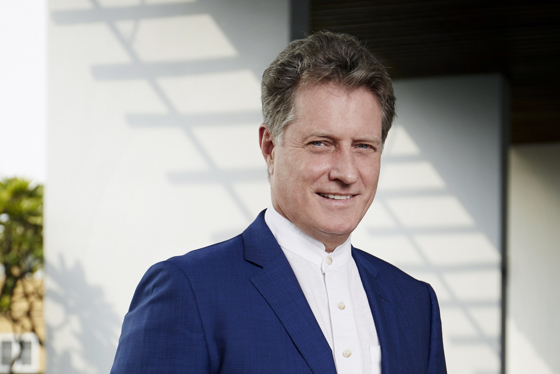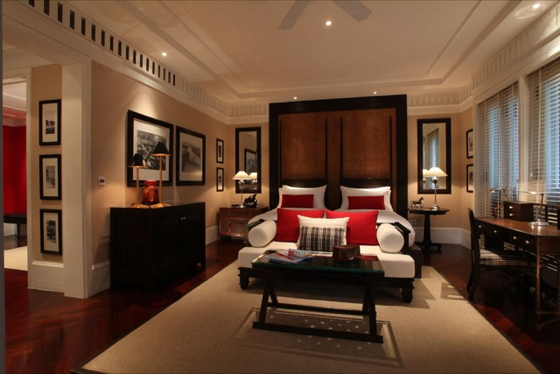Thailand’s Wongphanert family is spinning off a new luxury boutique hotel management company, 137 Pillars Hotels & Resorts, from their first hotel, 137 Pillars House Chiang Mai, which since opening in December 2011 has been showcasing the brand’s potential.
The 30-suite Chiang Mai property is a restoration of the northern headquarters of the East Borneo Trading Co. built 125 years ago. With land banks in Bangkok and Phuket, the group is now building two more hotels, 137 Pillars Suites & Residences Bangkok, scheduled to open by early 2017 with 34 suites and 179 private residences, and 137 Pillars Estate Phuket, scheduled to open in early 2019 on the north peninsula of Kata beach with 62 suites and villas.
It’s all systems go for the family to move into the hotel management business. They have hired Christopher Stafford as COO to direct and oversee the mission. Stafford has put in place executive team members, including five group directors, for projects and technical services, sales and marketing, culinary, F&B and finance. Stafford moved into the COO role from working with the family as vice president of hotel operations of SilverNeedle Hospitality, which will continue to manage the 137 Pillars House Chiang Mai until December. He also headed Anantara from 2000-2007 in Thailand and the Maldives, opening six properties for The Minor Group.

HOTELS talks to Stafford about working with the Wongphanert family to create a new brand.
HOTELS: Yet another Thai family that wants to go into hotel management. Why?
Christopher Stafford: The owners are leaders in the textile industry, with some 20 factories in Thailand. They would like to diversify the business as textile is starting to move out of the Kingdom because of lower labor costs elsewhere.
H: How many family members are involved?
CS: The older generation comprises three brothers and two sisters. The younger generation, whom I am currently training, is two siblings. They are both bright young ladies, both engineers. One of them, having graduated from Oxford, is already active in the business as assistant project manager. She is advanced for her years and has a fantastic understanding of engineering.
One of the family members, a Harvard graduate, is a landscape architect and has a good understanding about luxury.
They all like to learn about the business. I’m excited, as we’re going to create something fantastic, because of their knowledge of engineering, architecture and luxury, and because we’re able to grow a strong team with the right mix of talent, both Thai and international. We’re going to be the best in class.
H: Some would say it’s a recipe for disaster when too many owners are involved. How do you avoid that?
CS: Essentially, it is to involve them in a structured way and, having worked with owners all my life, I do know that, yes, the temptation is always there for owners to micro-manage, changing the tablecloth and the like. But these owners want the big picture aimed at creating a strong foundation for growth.
They have come from a relatively traditional business background that is labor intensive. Their HR component is still old-style, using ledgers. We’ve brought in the technology and systems that enable them to see what savings can be achieved through computerization.
I have no doubt they will want to run the business themselves in the long run. Part of my deal is to put a team in place on the management side but a lot of it is the education of the owners – teaching them the business in the sense of getting them to understand the special language of our trade, and to become familiar with the massive technological change that is impacting the industry.
What I’m also trying to do is to educate them that while having assets is fantastic, building an asset-rich hotel company is not necessarily the way to go. We can create the jewels, and then have investors and other developers come to us. That’s the experience I gained from working with Bill Heinecke (chairman and CEO, The Minor Group), who built the first four assets – the Anantara hotels in Hua Hin, Chiang Rai, Samui and the Maldives – that gave him a fantastic platform.

H: Following the first Pillars in Chiang Mai, you’re developing two other assets, in Bangkok and Phuket?
CS: Yes, Bangkok will open end-2016/early 2017 and Phuket 2018/2019. We’ve also acquired land on Phang Nga island for development. By the time Bangkok and Phuket open, we should have secured management contracts to manage luxury boutique hotels for other owners. We’re accelerating these deals.
Because we’re in a business that is labor and capital intensive, speed really matters; our costs are not going to go away. If you look at Bangkok alone, labor costs have risen 30% to 40% in the last five years, plus there’s a real shortage of great people. We have to bring in lots resources and that costs a lot. If our carrying costs are high to run a management company, we have to leverage them pretty quickly.
H: Define luxury boutique hotels.
CS: There are lots of collections, so I see a window to create a branded luxury boutique hotel company. I’m aiming for 20 hotels in the next five years, their size not more than 60 keys ideally and only all suites or all villas. There is going to be demand for this. I saw the other day a famous hotel here in Bangkok checking in Chinese guests from four tour buses, that you can’t even get to the reception. That’s what happens now to big, full-service hotels when the market turns soft and they have too many rooms. If I were a luxury customer paying that kind of rate (around US$300), I would not come back.
By remaining small, you know your guests. Let’s try to retain real hospitality in what we do. I started as a bellboy when the business was all about real hospitality. Today, if you listen to ordinary discussions among hoteliers, it’s become an investment; the conversation hardly includes guests anymore. It’s ARR, rate of return, etc. – we’re bankers instead of hoteliers. We’re obsessive compulsive about numbers instead of guests. My motivation is to change that.
H: We’ve seen other Thai companies trying to do what you’re doing.
CS: Our advantage is our owners have land banks. I also believe that to expand, I need to look outside the shell of Thailand. The real opportunity today is in places like Sri Lanka, Myanmar, Laos, Cambodia and Vietnam.
